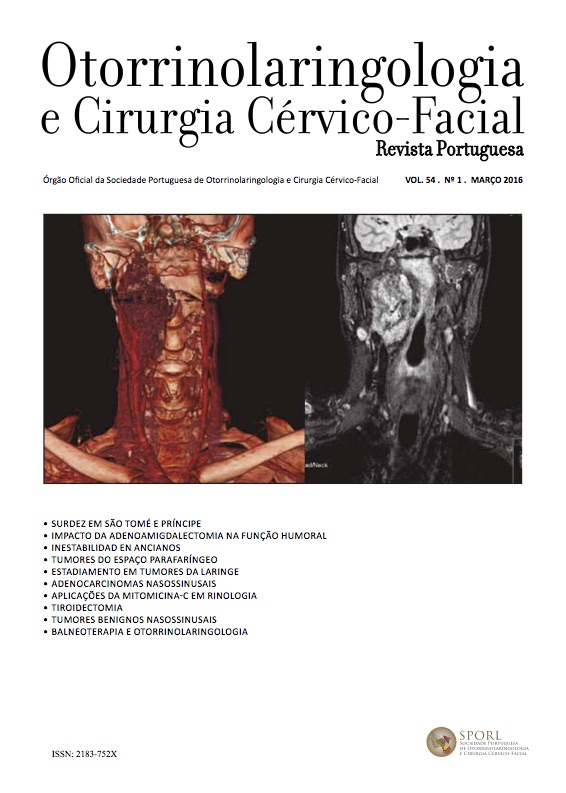Clinical vs. pathological staging in larynx tumors
DOI:
https://doi.org/10.34631/sporl.320Keywords:
Clinical staging, Pathological staging, squamous cell carcinoma, Larynx cancerAbstract
Introduction: Larynx cancer represent about 30% of head and neck tumors, and 90% are squamous cell carcinomas. Discrepancies have been reported in clinical and pathological TNM staging in larynx cancer in several studies.
Methods: Retrospective analysis of 179 patients undergoing laryngectomy between January 2009 and December 2014 in IPOFG of Coimbra. Results: With regard to the extent of the tumor (T), the restaging rate was 43.7%. The sensitivity in the detection of thyroid cartilage invasion or pre-epiglottic space was 55.6% and specificity of 83.4%. With regard to the cervical lymph nodes metastasis the re-staging rate was 36.7%. The sensitivity in the detection of cervical metastases was 85.1% and specificity of 78.5%.
Conclusion: Similar to values from other consulted studies, we consider that the reclassification rate is high. The combination of CT data with those from MRI in cases of doubt may improve results. In cases of doubt we consider prudent to opt for surgical treatment so we have a more accurate staging. We emphasize the importance of follow-up taking into account the existence of significant false negatives.
Downloads
References
Remontet, L. et al. Evolution de l’incidence et de la mortalité par cancer
en France de 1978 à 2000. Rev Epidemiol Sante Publique 51, 3–30 (2003).
Ross, G. L. et al. Improved staging of cervical metastases in clinically nodenegative
patients with head and neck squamous cell carcinoma. Ann. Surg.
Oncol. 11, 213–218 (2004).
Greenberg, J. S., El Naggar, A. K., Mo, V., Roberts, D. et al. Disparity in
pathologic and clinical lymph node staging in oral tongue carcinoma:
Implications for therapeutic decision making. Cancer 98, 508–515 (2003).
Edge, S. B., Compton, C. C. The American Joint Committee on Cancer:
the 7th edition of the AJCC cancer staging manual and the future of TNM.
Annals of surgical oncology 17, 1471–1474 (2010).
Foucher, M., Barnoud, R., Buiret, G., Pignat, J.C. et al. Pre- and
Posttherapeutic Staging of Laryngeal Carcinoma Involving Anterior
Commissure: Review of 127 Cases. ISRN Otolaryngol. 2012, 1–3 (2012).
Agada, F. O., Nix, P. A., Salvage, D., Stafford, N. D. Computerised tomography
vs. pathological staging of laryngeal cancer: A 6-year completed audit cycle.
Int. J. Clin. Pract. 58, 714–716 (2004).
Zbären, P., Becker, M., Läng, H. Staging of laryngeal cancer: Endoscopy,
computed tomography and magnetic resonance versus histopathology. Eur.
Arch. Oto-Rhino-Laryngology 254, (1997).
Barbosa, M. M. et al. Anterior vocal commissure invasion in laryngeal
carcinoma diagnosis. Laryngoscope 115, 724–730 (2005).
Zbaren, P., Becker, M., Lang, H. Pretherapeutic staging of laryngeal
carcinoma. Clinical findings, computed tomography, and magnetic
resonance imaging compared with histopathology. Cancer 77, 1263–1273
(1996).
Bagatella, F., Bignardi, L. Behavior of cancer at the anterior commissure
of the larynx. Laryngoscope 93, 353–6 (1983).
Krespi, Y. P., Meltzer, C. J. Laser surgery for vocal cord carcinoma involving
the anterior commissure. Ann. Otol. Rhinol. Laryngol. 98, 105–9 (1989).
Kirchner, J. A., Cornog, J. L., Holmes, R. E., Haven, N. Transglottic Cancer
Atransglottic. (2015).
Nakayama, M., Brandenburg, J. H. Clinical underestimation of laryngeal
cancer. Predictive indicators. Archives of otolaryngology--head & neck
surgery 119, 950–957 (1993).
Biron, V. L., O’Connell, D. A., Seikaly, H. The impact of clinical versus
pathological staging in oral cavity carcinoma - A multi-institutional analysis
of survival. J. Otolaryngol. - Head Neck Surg. 42, 2–5 (2013).
Zbaren, P., Christe, a, Caversaccio, M., Stauffer, E. et al. Pretherapeutic
staging of recurrent laryngeal carcinoma: Clinical findings and imaging
studies compared with histopathology. Otolaryngol. - Head Neck Surg. 137,
–491 (2007).
Castelijns, J. a, Becker, M., Hermans, R. Impact of cartilage invasion on
treatment and prognosis of laryngeal cancer. Eur. Radiol. 6, 156–169 (1996).
Becker, M., Casselman, J. W., Kohler, R., Dulguerov, P. et al. Neoplastic
Invasion of Laryngeal Cartilage : Reassessment of Criteria for Diagnosis at
MR Imaging 1 Methods : Results : Conclusion : 249, 551–559 (2008).
Pentenero, M. et al. Accuracy of 18F-FDG-PET/CT for staging of oral
squamous cell carcinoma. Head Neck 30, 1488–1496 (2008).






